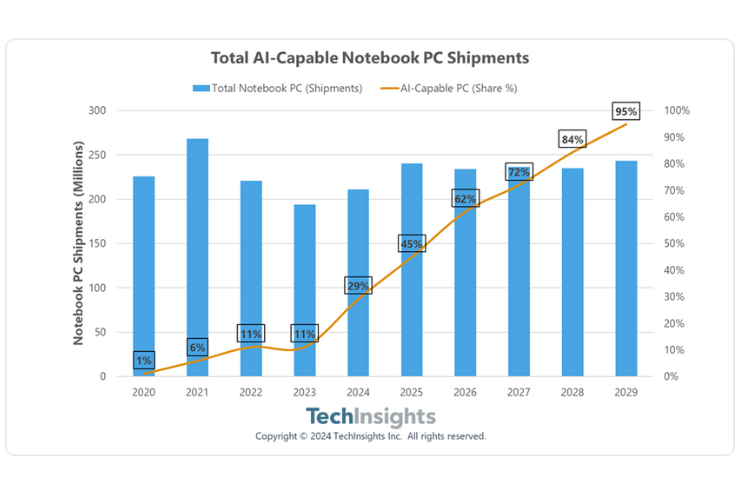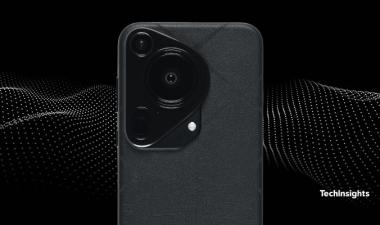AI Notebook PC Forecast: 95% AI-Capable Shipments by 2029
AI-capable notebook PCs– defined as a notebook PC that ships with a dedicated chipset built specifically to accelerate AI computing on device (i.e. an NPU) –will represent 95% of the total notebook PC market, or 230.5 million units, shipped in 2029. As hype around generative AI has reached fever pitch, the PC market is hoping to capitalize on this interest, driving PC upgrades with promises of enhanced user experience, productivity, and security – all by the power of AI. 2024 will be a banner year for AI-capable PCs, especially in the second half of the year, which is when notebooks PCs featuring NPUs that can run 40 tera operations per second (TOPS) are expected to make their market debut.
In this report, we examine the AI-capable notebook PC market and its expected trajectory from niche commercial uses to the wider consumer market.
The rapid rise of AI-capable notebook PCs, from 29% of total notebook shipments in 2024 to 62% in 2026 will benefit from an already strong refresh cycle expected throughout 2024 and 2025. Between aging COVID-era devices and the end of support for Windows 10, notebook PC sales are expected to grow to a new high of 243.1 million units in 2025.
While the adoption of AI-capable PCs is not expected to have a significant impact on PC’s total addressable market (TAM), how fast these PCs are expected to move from more niche commercial markets to mass adoption are a marked departure from the norm.
What may also differentiate the era of AI PCs is a shift away from the traditional x86 architecture towards Arm, an architecture that targets power efficiency. Qualcomm has tried to break into the PC market previously and struggled with their Arm-based solutions for Windows PCs, however the launch of the Snapdragon X Elite, with its 45 TOPS NPU, may be the processor that finally propels Qualcomm to a serious PC competitor. Also, Apple’s M1 MacBooks, which debuted in late 2020, were first to market with what we define as an AI-capable notebook PC, although Apple has been relatively quiet on the AI-front otherwise.
The behemoth in the room we have not mentioned is Nvidia. While they dominate the larger AI space, they do not currently make a PC processor, though it is rumored they are building an Arm-based CPU for release in 2025. We have also yet to formally hear from MediaTek, a small yet powerful player in the Chrome market, who also support an Arm-based architecture.
OEMs recognizing a potential shift change have started to diversify their silicon, but it is still Intel’s game to lose. There is no doubt that the Arm architecture, embraced by semiconductor players outside of Intel, will play a critical role in the development of the AI-capable notebook PC market, however large will become clearer as products are released later this year.




